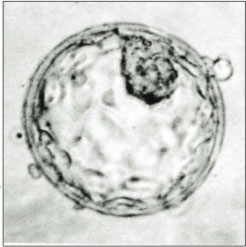 |
| Img credit: Mr. J Conaghan, Wikimedia Cmns |
f conception, asking why the Church does not permit artificial reproductive technologies or techniques (ARTs). The student accepted that sex is unitive and procreative and meant for marriage; moreover, the student agreed with
I really love hearing from medical students who are seeking understanding in the mind of faith. As the student pointed out, an infertile or subfertile couple does not disobey God's law by having sex, even though there is a disorder inhibiting the fruits of the procreative aspect. But the reason why the Church teaches that IVF is wrong is that sex is the only act which is legitimately procreative, the only way we are meant to conceive. We can syllogize to this conclusion with two premises. The major premise is that ARTs are not sex.*
_feeding_tube_CRUK_341.svg/2000px-Diagram_showing_the_position_of_a_percutaneous_endoscopic_gastrostomy_(PEG)_feeding_tube_CRUK_341.svg.png) |
| Img credit: Cancer Research UK, Wikimedia Commons |
I thought it was interesting that the student called ARTs (e.g. IUI or embryo transfer) "procreative acts" in the original question. This is exactly right! These things can lead to babies, so they're procreative acts. But they are not sexual acts: they are professional, medical acts without foreplay, climax, orgasm, etc. Our G-tube patient gets liquids pushed through his tube (a nutritive act), but he's not eating. Medical parlance and common sense reflects this: we won't say "he's eating" until he's using his mouth. G-tube feedings aren't eating; ARTs aren't sex or sexual acts.
Moreover, ARTs cannot be aspects of sexual acts. When our G-tube patient starts a tube feed, he's nourishing himself, but he's not doing "the nutritive aspect of eating." He's not eating at all, and he can't complete aspects of one action while doing a related but separate action. Similarly, if an infertile or subfertile woman has an IUI, she may be procreating, but she's not doing "the procreative aspect of sex." They are separate acts and one's intention to view the acts together do not knit them together. ARTs cannot be viewed as aspects of sexual acts.
The minor premise, "All conceptions must occur through sex," is defended in the next part.
*By "sex," I mean heterosexual sex using reproductive organs, not oral or anal intercourse.
Very true statement at the end, greetings!
ReplyDelete